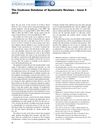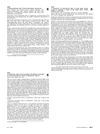Search
for
Sort by
Research
720-750 / 1000+ resultsresearch Comparison of the Efficacy of Topical Minoxidil 5% and Adenosine 0.75% Solutions on Male Androgenetic Alopecia and Measuring Patient Satisfaction Rate
Adenosine led to higher patient satisfaction than minoxidil for hair loss treatment.

research Evaluating the Safety and Effectiveness of Minoxidil (5%) with Procapil, Redensyl, Caffeine & Transcutol vs Plain Minoxidil (5%) in Androgenetic Alopecia
MpowerTM may improve hair growth and satisfaction more than plain minoxidil, with mild side effects.

research Comparative Study of Topical Minoxidil (5%) Plus Finasteride (0.1%) Versus Platelet-Rich Plasma Plus Topical Minoxidil (5%) Plus Finasteride (0.1%) in Patients with Androgenic Alopecia
Adding PRP to minoxidil and finasteride is more effective for hair loss.
research Diffuse Face And Ear Hypertrichosis Caused By 5% Topical Minoxidil In An Adult Woman With Spontaneous Resolution
Facial hair growth from minoxidil stopped after she quit using it.

research Platelet-Rich Plasma Applications, The Past 5 Years: A Review Article
PRP can reduce pain and improve function, but more standardized research is needed.

research Virtual Insights into Natural Compounds as Potential 5α-Reductase Type II Inhibitors: A Structure-Based Screening and Molecular Dynamics Simulation Study
Eriocitrin and silymarin might be effective for hair loss treatment and need more research.

research Injections of Platelet-Rich Plasma Prepared by Automatic Blood Cell Separator Combined With Topical 5% Minoxidil in the Treatment of Male Androgenetic Alopecia
Using platelet-rich plasma injections and 5% minoxidil topically can safely and effectively treat mild-to-moderate male pattern baldness.

research Longitudinal Clinical Course in Patients With 5α-Reductase Type 2 Deficiency Treated With Testosterone and Dihydrotestosterone During Infancy and Puberty
Testosterone and dihydrotestosterone treatments can help with penile growth in males with 5α-reductase type 2 deficiency, with dihydrotestosterone being more effective in infancy.

research In Vivo Study of the Effect of 5% and 10% Nebivolol Cream on Hair Growth in Mice Models
Nebivolol cream may be a promising hair loss treatment by improving blood flow and nourishing hair follicles.

research LibGuides: L3Y2 Tutorial 2022 - Critical Thinking: Claim 5: Caffeine Reduces Hair Loss
Caffeine in Alpecin shampoo may help prolong hair root activity and reduce hair loss.

research The Cochrane Database of Systematic Reviews - Issue 5 2012
The Cochrane Database published its 5000th review in 2012, covering various health topics and updating conclusions based on new research.
research Effect of the Dual 5α-Reductase Inhibitor Dutasteride on Markers of Tumor Regression in Prostate Cancer
Dutasteride may help treat prostate cancer by causing cancer cells to shrink and die.
![Patent Evaluation: Hexahydrobenzo[f]quinolines as 5α-Reductase Inhibitors](/images/research/1634373b-f615-46c7-a157-21394e3366be/small/21095.jpg)
research Patent Evaluation: Hexahydrobenzo[f]quinolines as 5α-Reductase Inhibitors
Hexahydrobenzo[f]quinolines are effective at blocking the enzyme 5α-reductase.

research Comparison of the Therapeutic Effects of Minoxidil 5% Solution Alone with Flutamide 2% and Minoxidil 5% Mixed Solution in Patients with Androgenetic Alopecia Referring to Dermatology Clinic of Isfahan University of Medical Sciences
The mix of 2% flutamide and 5% minoxidil improves hair thickness more than just 5% minoxidil alone in treating hair loss.
research Topical Cetirizine 1% vs Minoxidil 5% Gel in the Treatment of Androgenetic Alopecia

research A Comparative Study of Microneedling with PRP Plus Minoxidil (5%) and Minoxidil (5%) Alone in Androgenetic Alopecia
Microneedling with PRP and minoxidil (5%) improves hair growth more than minoxidil (5%) alone.

research External Genitalia Abnormalities in Male Rats Exposed In Utero to Finasteride, a 5α-Reductase Inhibitor
Finasteride exposure in pregnancy causes genital abnormalities in male rats.

research An Open, Randomized, Comparative Study of Oral Finasteride and 5% Topical Minoxidil in Male Androgenetic Alopecia
Oral finasteride works better than topical minoxidil for hair growth, both are safe.

research Clinical and Endocrine Effects of Finasteride, a 5α-Reductase Inhibitor, in Women with Idiopathic Hirsutism
Finasteride reduces hairiness and androgen levels in women with unexplained excessive hair growth.

research Studies on Neurosteroids XXV: Influence of a 5α-Reductase Inhibitor, Finasteride, on Rat Brain Neurosteroid Levels and Metabolism
Finasteride almost fully depletes allopregnanolone in rat brains and enhances 20α-DHP, but doesn't change 3α-DHP levels.

research Persistent Erectile Dysfunction in Men Exposed to 5α-Reductase Inhibitors, Finasteride, or Dutasteride
Using finasteride or dutasteride may cause long-lasting erectile dysfunction.

research Leydig Cell Hyperplasia and Adenomas in Mice Treated with Finasteride, a 5α-Reductase Inhibitor: A Possible Mechanism
High doses of finasteride cause cell growth and tumors in mice.

research In Vitro and In Vivo Skin Distribution of 5α-Reductase Inhibitors Loaded Into Liquid Crystalline Nanoparticles
Chitosan-coated nanoparticles improve skin delivery of hair loss treatments with fewer side effects.

research Reversible Decreases of Fertility in Male Sprague-Dawley Rats Treated Orally with Finasteride, a 5α-Reductase Inhibitor
Finasteride temporarily lowers male rat fertility without affecting libido.

research An Open-Label Randomized Multicenter Study Assessing the Noninferiority of a Caffeine-Based Topical Liquid 0.2% Versus Minoxidil 5% Solution in Male Androgenetic Alopecia
Caffeine-based liquid 0.2% is as effective as minoxidil 5% for treating male hair loss.
research Effects of Finasteride, a 5 Alpha-Reductase Inhibitor, on Circulating Androgens and Gonadotropin Secretion in Hirsute Women

research Discovery of a Novel Hybrid from Finasteride and Epristeride as 5α-Reductase Inhibitor
New hybrid compound found to effectively prevent hair loss.

research Epigallocatechin Gallate-Mediated Alteration of the MicroRNA Expression Profile in 5α-Dihydrotestosterone-Treated Human Dermal Papilla Cells
Green tea component EGCG may help prevent hair loss by changing microRNA levels in certain scalp cells.

research Bee Venom Promotes Hair Growth by Inhibiting 5α-Reductase Expression
Bee venom helps hair grow and may work better than some common treatments.